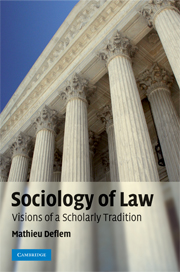Book contents
- Frontmatter
- Contents
- Preface and acknowledgements
- Introduction: sociology, society, law
- Part I Theoretical foundations of the sociology of law
- Part II Development and variations of the sociology of law
- 4 The theoretical move towards the sociological study of law
- 5 From sociological jurisprudence to sociology of law
- 6 Sociology of law and the antinomies of modern thought
- Part III Sociological dimensions of law
- Part IV Special problems of law
- Conclusion: Visions of the sociology of law
- Bibliography
- Index
6 - Sociology of law and the antinomies of modern thought
Published online by Cambridge University Press: 05 June 2012
- Frontmatter
- Contents
- Preface and acknowledgements
- Introduction: sociology, society, law
- Part I Theoretical foundations of the sociology of law
- Part II Development and variations of the sociology of law
- 4 The theoretical move towards the sociological study of law
- 5 From sociological jurisprudence to sociology of law
- 6 Sociology of law and the antinomies of modern thought
- Part III Sociological dimensions of law
- Part IV Special problems of law
- Conclusion: Visions of the sociology of law
- Bibliography
- Index
Summary
The evolution of modern sociology has been marked by an increasing diversity of theoretical perspectives. Theoretical pluralism in sociology has developed to such an extent that it is today often unclear where theoretical lines are drawn, what they mean, and what the value of such diversity might be. Some scholars have condemned theoretical pluralism as a key weakness in sociology, showing a lack of unity in sociological thought, while others have seen in sociology's theoretical diversity a richness that reflects the complexity of social life. Theoretical diversity also marks the specialty field of the sociology of law. This chapter will provide an overview of the main strands of theoretical perspectives in the modern sociology of law on the basis of a review of the theoretical ideas that emerged out of earlier orientations. This discussion should also be able to bridge the various theoretical perspectives with the substantively guided chapters in the next two parts of this book. As such, this chapter will look at once backwards and forward to theoretical developments in the sociology of law.
The analyses in this chapter are developed around the theoretical revolutions and evolutions that emerged in sociology since the gradual decline of the functionalist dominance. Historically, these developments took place roughly from the 1960s onwards and have continued to characterize the discipline at large and the sociology of law, in particular, until this day.
- Type
- Chapter
- Information
- Sociology of LawVisions of a Scholarly Tradition, pp. 117 - 142Publisher: Cambridge University PressPrint publication year: 2008



